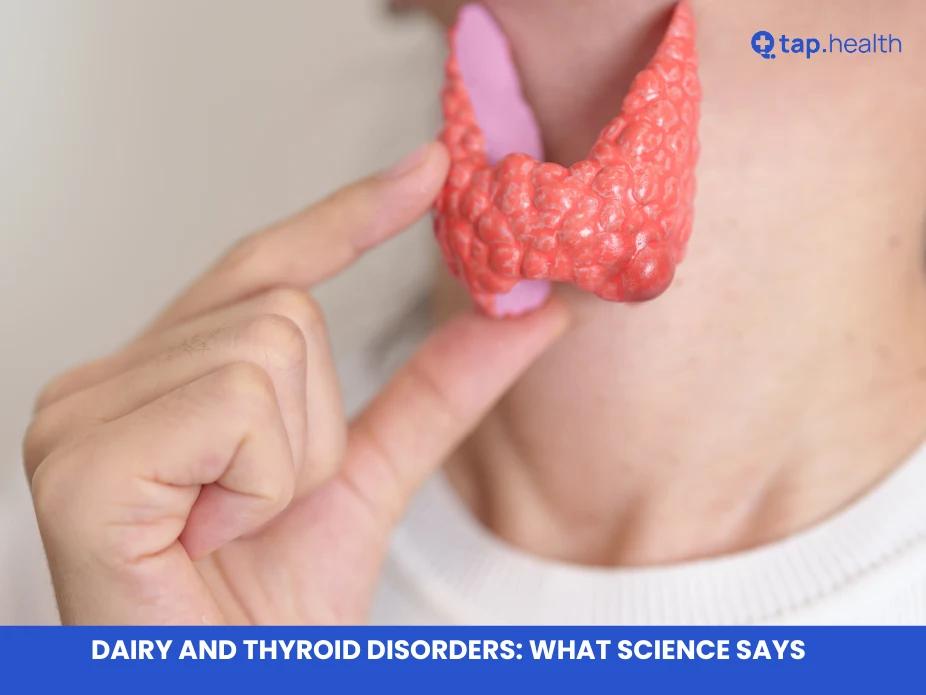Thyroid disorders, including hypothyroidism (underactive thyroid) and hyperthyroidism (overactive thyroid), are common conditions that affect millions of people worldwide. These disorders can have a significant impact on your metabolism, energy levels, and overall health. While there are various factors that can influence thyroid health, including genetics, lifestyle, and diet, many people wonder whether certain foods, such as dairy products, might play a role in thyroid function.
In this blog post, we will examine the relationship between dairy and thyroid health, what the science says, and whether dairy consumption can positively or negatively impact thyroid disorders.
Understanding Thyroid Disorders
Before diving into the effects of dairy on thyroid health, it’s essential to understand thyroid function and disorders.
The thyroid gland is responsible for producing thyroid hormones (T3 and T4), which help regulate your metabolism, energy production, and overall body function. When the thyroid gland doesn’t produce enough of these hormones, it can lead to hypothyroidism (slowed metabolism, weight gain, fatigue) and, conversely, overproduction of thyroid hormones can lead to hyperthyroidism (increased metabolism, weight loss, anxiety).
Common causes of thyroid disorders include autoimmune diseases (such as Hashimoto’s thyroiditis and Graves’ disease), iodine deficiency, and certain lifestyle or environmental factors. Diet plays a crucial role in managing thyroid health, and there has been growing interest in how certain foods, such as dairy, may affect thyroid function.
How Dairy Affects Thyroid Health
The relationship between dairy and thyroid health is a topic of ongoing debate, and research is still evolving. However, several potential mechanisms have been identified that explain how dairy consumption could impact thyroid function, particularly in individuals with thyroid disorders.
1. Dairy and Iodine Absorption
Dairy products are often touted as a source of iodine, an essential nutrient for thyroid hormone production. Iodine is necessary for the synthesis of thyroid hormones, and without enough iodine, the thyroid cannot produce adequate levels of T3 and T4. In this sense, dairy can be beneficial for thyroid health, especially in populations where iodine deficiency is a concern.
Sources of Iodine in Dairy:
- Milk
- Cheese
- Yogurt
However, the problem arises when dairy interferes with the absorption of iodine. Some studies suggest that high levels of calcium in dairy products could inhibit iodine absorption in the body. This could be problematic for individuals who are already iodine-deficient or have thyroid disorders such as hypothyroidism. The impact may vary depending on the individual’s overall iodine levels and dietary habits.
For more information on iodine’s role in thyroid health, refer to the National Institutes of Health (NIH) article on iodine.
2. Dairy and Autoimmune Thyroid Disease
For individuals with autoimmune thyroid conditions like Hashimoto’s thyroiditis, the situation is more complicated. Research suggests that dairy may exacerbate inflammation in the body, which can worsen autoimmune responses. Specifically, some individuals with autoimmune thyroid disease may experience symptoms such as increased inflammation, joint pain, or gut issues when they consume dairy products. This may occur because dairy can stimulate an immune response, leading to a heightened inflammatory state.
A 2019 study published in the Journal of Clinical Endocrinology & Metabolism found that dairy consumption may increase the risk of developing autoimmune thyroid disease due to its pro-inflammatory effects, particularly in individuals with a genetic predisposition. Read more about this study here.
While dairy’s inflammatory effects are not universal, those with autoimmune thyroid conditions should monitor their symptoms and consider reducing dairy intake if they notice a negative impact.
3. Lactose Intolerance and Thyroid Health
Some individuals with thyroid disorders may also experience lactose intolerance, which is the inability to digest lactose, the sugar found in milk. Symptoms of lactose intolerance include bloating, gas, and diarrhea. For people with hypothyroidism or other thyroid issues, these digestive problems can worsen, leading to further discomfort and digestive distress. This is especially true for those with Hashimoto’s thyroiditis, as autoimmune conditions often coexist with other gastrointestinal issues.
Lactose intolerance is common in individuals with autoimmune thyroid disease. In fact, research has shown that people with hypothyroidism are more likely to have lactose intolerance due to the slowing down of digestion. You can learn more about the connection between lactose intolerance and thyroid disease.
Expert Contributions
Dr. Mark S. Lupo, an endocrinologist, emphasizes that “Dairy may affect individuals with thyroid disorders differently depending on their unique health status, and some people with autoimmune thyroid diseases might benefit from reducing or eliminating dairy products” (Source).
Recommendations Grounded in Proven Research and Facts
If you have thyroid disorders, here are some evidence-based recommendations regarding dairy consumption:
1. Moderate Dairy Intake
- For individuals without lactose intolerance, moderate dairy intake can be beneficial due to its iodine content. However, be mindful of calcium levels and their potential effect on iodine absorption.
2. Consider Dairy Alternatives
- If you have lactose intolerance or autoimmune thyroid conditions, you may want to explore dairy-free alternatives such as almond milk, coconut yogurt, or lactose-free dairy products. Many dairy substitutes are fortified with iodine and other essential nutrients, which can still support thyroid function.
3. Consult Your Doctor
- It’s crucial to speak with a healthcare provider before making significant dietary changes, especially if you have thyroid conditions or autoimmune diseases. They can help tailor dietary recommendations that align with your specific health needs.
FAQ: Dairy and Thyroid Health
Q1: Can dairy cause hypothyroidism?
A1: Dairy does not directly cause hypothyroidism, but it may interfere with thyroid hormone production and absorption, particularly in people with iodine deficiency or autoimmune thyroid disease.
Q2: Should I cut out dairy if I have thyroid problems?
A2: It depends on your individual symptoms and condition. If you have autoimmune thyroid disease or lactose intolerance, reducing or eliminating dairy may be beneficial. Always consult with your doctor before making dietary changes.
Q3: Is it safe to consume dairy if I have Hashimoto’s thyroiditis?
A3: While there is no one-size-fits-all answer, some individuals with Hashimoto’s may benefit from reducing dairy intake due to its potential to exacerbate inflammation. Monitoring your symptoms is key.
Conclusion
The impact of dairy on thyroid health is a complex issue, with research suggesting both positive and negative effects depending on individual circumstances. Dairy can provide beneficial nutrients like iodine and calcium, but it may also interfere with thyroid function in some individuals, especially those with autoimmune thyroid disorders. As with many dietary considerations, the key is moderation and personalization.
Always consult with a healthcare provider for advice on whether dairy is right for you, and make dietary changes that support your thyroid health and overall well-being.
- References:
- National Institutes of Health (NIH) – Iodine Factsheet



